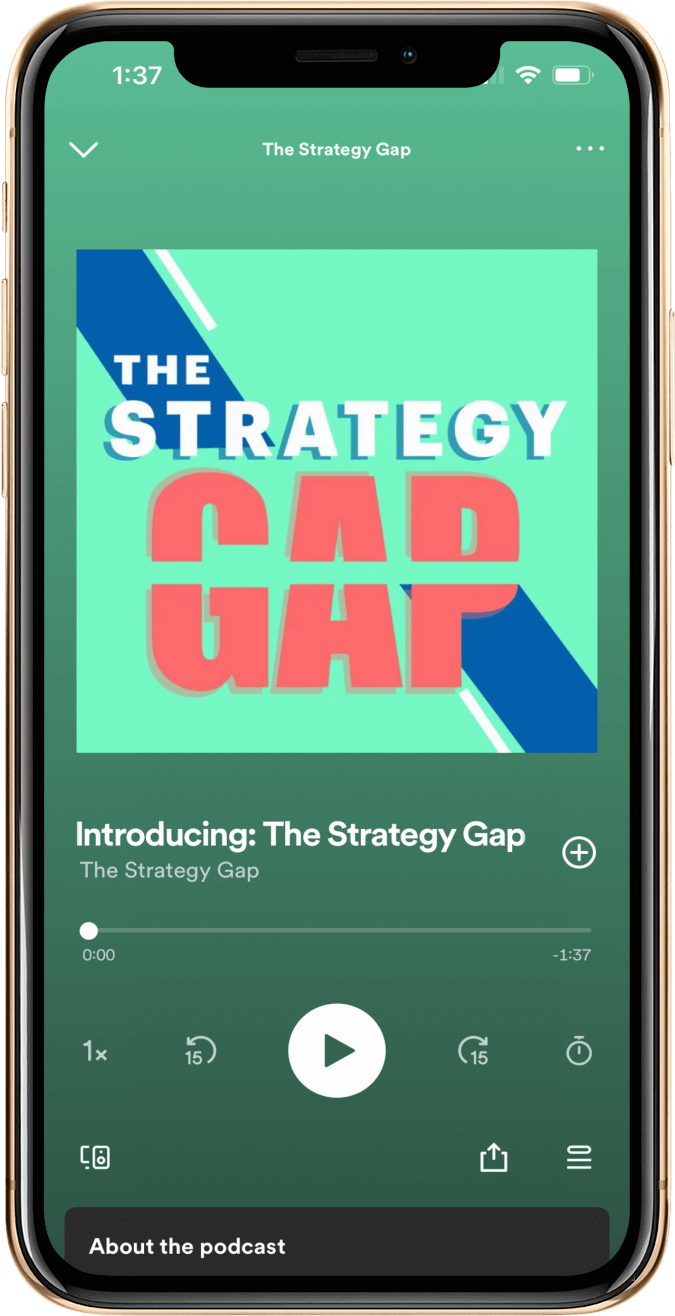In business operations and strategy, it’s not enough to have great ideas—you need to advocate for them effectively. Whether you’re leading a strategic initiative, pitching a new process improvement, or pushing for a shift in company priorities, the ability to build a compelling case is crucial. Mark Muston, Head of Business Operations & Strategy at Modern Health, joined The Strategy Gap podcast to share insights on making a persuasive argument, leveraging diverse perspectives, and treating leadership like venture capitalists when securing buy-in for new initiatives.
Hiring for Impact and Looking Beyond the Resume
When it comes to building high-impact teams, rigid hiring criteria can often do more harm than good. Mark emphasizes the importance of prioritizing intrinsic motivation, curiosity, and problem-solving skills over traditional resume credentials.
“You don’t need this rigid resume as much as you need this intrinsic motivation and this curiosity and this problem solving,” Mark shares. “Encouraging folks to look for the best people and not get caught up on resume is key.”
A successful strategy team isn’t just about past experience—it’s about the ability to think critically, adapt, and offer fresh perspectives. Mark, who comes from a finance and supply-demand modeling background, brings a unique lens to the traditionally healthcare-focused world of Modern Health.
“My perspective is like a finance background and like a supply-demand, you know, modeling person coming into these conversations,” he explains. “It does provide a new angle to kind of the traditional healthcare background.”
This diversity of thought is essential in strategic decision-making. When teams are composed of individuals from different disciplines, they can challenge assumptions and bring innovative solutions to the table. The takeaway? Instead of focusing solely on past titles and industry experience, consider the broader value a candidate brings to the conversation.
Crafting Data-Driven Narratives to Sell Ideas
Convincing leadership to invest in a new initiative often comes down to how well you can tell the story. Data is important, but it’s only powerful when paired with a compelling narrative. Mark stresses the importance of distilling complex ideas into digestible, outcome-driven messages.
“A lot of what we’re really trying to do is build narratives and build data-driven stories that we can sell internally to go build things,” he says.
One of the first things he looks for when hiring strategists is their ability to communicate their impact clearly.
“I’m looking at their resumes to see—can they concretely sell what they’ve done? If you see one of those resumes that’s a lot of information but not a lot of outcomes, that can usually be a sign that maybe they’re not good at condensing things down into the elevator pitch or that real ROI story.”
This ability to “sell” an idea is not just a skill for sales teams—it’s crucial for anyone in business operations, strategy, or program management. As Mark puts it, “Sales is kind of like the underappreciated role of anyone in these sort of strategic initiatives.”
The lesson here is clear: when pitching a new idea, focus on the results it will drive. Instead of simply presenting the features of your initiative, tell a compelling story about the problem it solves, the measurable impact it will have, and why it deserves leadership’s investment.
Treating Leadership Like Venture Capitalists
One of the most effective ways to gain buy-in for strategic initiatives is to approach leadership as if they were investors. Instead of asking for resources with vague assurances of success, Mark suggests treating each proposal like a pitch to a venture capitalist.
“We go to them and, if it’s a proactive request, say, ‘If you give us X, we will deliver Y.’ And we sort of build that and grow that and start to show those results.”
This approach creates a cycle of trust and credibility. Once you deliver on your initial promise, it’s easier to go back for additional resources.
“As a team has grown and expanded more initiatives, that’s sort of how we’ve done it,” Mark explains. “We’ve gone out, proven the quantifiable benefit of taking on this one thing, and then we come back six months or a year later, take on that second thing, and say, ‘Hey, we’ve proven success. We’ve agreed on the outcomes. We’ve delivered those. We want to pitch you on this new idea.’”
This method not only increases the likelihood of securing approval but also fosters a culture of accountability and results-driven decision-making. It transforms leadership from gatekeepers into partners who are actively invested in the success of the initiatives.
Bringing It All Together: Strategy, Advocacy, and Execution
At the heart of business strategy is the ability to advocate effectively—whether it’s for the right talent, a compelling business case, or a long-term initiative. Mark’s insights offer a roadmap for professionals looking to strengthen their impact:
- Hire for potential, not just experience. Diverse perspectives create better strategic discussions and lead to more innovative solutions.
- Use data to tell a story. A well-crafted narrative backed by solid numbers is far more persuasive than raw data alone.
- Approach leadership as investors. Show clear outcomes and deliver on promises to build trust and secure long-term buy-in.
Strategic initiatives don’t succeed in a vacuum. They require thoughtful advocacy, strong communication, and a results-driven approach to execution. By applying these principles, professionals in strategy and operations can ensure their ideas don’t just get heard—but get acted on.
Want to hear more insights from Mark Muston? Tune in to the latest episode of The Strategy Gap to dive deeper into these strategies and learn how to make a lasting impact in your organization.
Listen to The Strategy Gap
A podcast about the space between savvy strategy and practical execution, including everything that can go wrong on the way.




